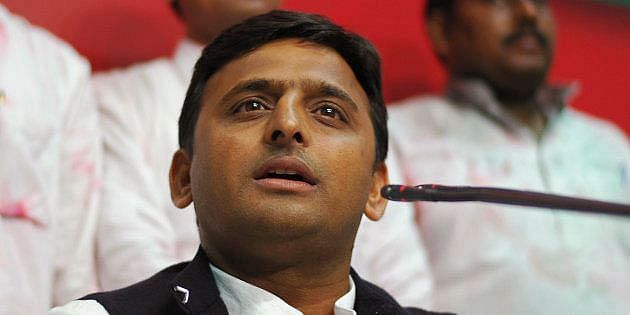POBNEWS24, Dhaka, Jan 14, 2022 : Just before the Assembly polls, the BJP took another big hit in Uttar Pradesh. Recently, the party’s top leader and state labor minister Swami Prasad Maurya joined the Samajwadi Party (SP). Uttar Pradesh Food Safety Minister Dharma Singh Saini left the BJP on Thursday. He is the third minister to leave the BJP in the last three days. At the same time, Mukesh Sharma, MLA of Firozabad in West-Uttar Pradesh, has left the BJP. With them, the number of BJP defectors stood at eight.
According to political sources, five to six more MLAs may resign in a day or two. All the MLAs who have left the BJP in the last few days are classified as ‘Other Backward’ (OBC) or ‘Most Backward’ (MBC). Not only that, after his resignation, they are appearing before the first defector ‘OBC’ leader Swami Prasad Maurya. He has started a revolt against the BJP.
Samajwadi Party (SP) leader Akhilesh Yadav has emerged as the BJP’s main opponent in this year’s polls. And the possibility of their joining Akhilesh Yadav’s team is strong. Political analysts believe that an announcement may be made on Friday.
An unmistakable question is coming up through this mass exodus of the backward class leaders of the state. But is the ‘Mandal’ politics, which put Mandaraj Bishwanath Pratap Singh, a disgruntled Congress leader from Uttar Pradesh, in Delhi’s masnad in the late eighties, emerging in opposition to the BJP’s ‘commando’ policy in India’s largest state?
There are several reasons for this question. And those are the BJP-apostates, not just the ‘OBC’ and ‘MBC’ leaders of the state, the ‘Mandal’ politics has established them. It is noteworthy here that the statement of resignation of each of them is also one, where the ‘extreme neglect’ of the backward society in the hands of the caste Hindus during the BJP period is written in a tone of complaint.
Brahmins and Kayasthas are also angry at BJP’s ‘Thakur’ (Kshatriya) Chief Minister Yogi Adityanath. They have been vocal for a long time about allegations of ‘Thakurism’ against the Chief Minister in all aspects of running the state. He has also complained to the central leadership about the issue many times. But nothing worked. Although the chief ministers of Uttarakhand and Himachal Pradesh have been changed repeatedly, Adityanath has not been shaken. Although the Brahmin-Kayasthas were dissatisfied with Adityanath, they could not create pressure as a caste or as a group of backward people. And it is not that the central leadership did not feel the fire of resentment in this regard. In many ways, the central leadership of the BJP has tried to be active. Despite trying to quell the anger through the backward Deputy Chief Minister Keshab Prasad Maurya, Adityanath’s ‘Thakurism’ could not be stopped. Besides, all the efforts of Prime Minister Narendra Modi and Home Minister Amit Shah over the last four-five months have failed.

And from this new political equation has arisen the question of the new relevance of ‘Mandal’ politics. Bishwanath Pratap Singh, the father of ‘Mandal’ politics, had to appear in a new incarnation. The people’s front had to be formed by leaving the Congress. His ‘Mandal’ politics came up as a counter to the politics of BJP’s Kamandul, holding the hand of Lal Krishna Adhavani. The success of the BJP is also in that stream. This time the ‘Mandal’ politics is gaining momentum as a counter to that politics. The various backward classes have started this new style of politics in alliance. In Uttar Pradesh, the national politics is buzzing about who will laugh and who will cry in the end. This is the biggest challenge for the BJP in the last seven and a half years.
This time there is no new leader in the leadership of this new ‘Mandal’ politics. Former Chief Minister Samajwadi Party (SP) leader Akhilesh Yadav is also present. Baba Mulayam Singh linked Muslims and Yadavs (leading among the backward) in the caste-based political flow of Uttar Pradesh. Akhilesh himself enjoyed the benefits of this alliance and became the Chief Minister. This is the first time he has moved away from that and enlarged the team’s canvas.
The Modi-Amit Shah duo has been successfully combining social engineering since 2016 to blend all castes with Hindutva, and Akhilesh has long since established himself. Jayant Chowdhury, the leader of Rashtriya Lok Dal, a coalition party based in West-Uttar Pradesh, has been drawn into the alliance by anticipating the dynamic nature of the peasant movement. Eastern backward leader Suhel Dev, who had earlier left the BJP, also joined hands with Bharatiya Samaj Party leader Omprakash Rajbhar.
The BJP had formed an alliance with Rajbhar in the 2016 elections. Rajbhar’s team fought in eight seats and won four. In some parts of East-Uttar Pradesh, the party has 8 to 12 per cent votes. If Swami Prasad Maurya joins his party, Akhilesh’s alliance will become ‘Yadav + Muslim + Jat + OBC + MBC’. It would not be a surprise if any of the smaller caste-based parties, which were drawn to the BJP, joined the ‘Rainbow Alliance’ formed by Akhilesh. This is how the development of ‘Mandal’ politics happened so fast.
This is definitely a big blow to the BJP, even unexpected. Because, it was beyond the BJP’s imagination that such a revolt would hit during the selection of candidates in the first and second rounds of voting. However, before the election, the BJP is coming to the field with its waist tied to cope with such a push. In the meantime, in a two-day meeting in Delhi, it has been decided that more backward candidates will be fielded in the elections to curb the effects of defection. He has been instructed to select suitable candidates. At the same time, BJP is going to promote Hindutva. For this, the ruling party of India is thinking of leaving the center of Gorakhpur and fielding the Chief Minister from Ayodhya.
A BJP central leader told Prothom Alo on Thursday, “We have the capacity to handle the push. The personal appeal of the Prime Minister is undeniable. Add Hindutva to it. There is a strong organizational presence in all the districts. We also have all the skills needed to vote. The benefits of government programs that ordinary people are getting are no less influential. The biggest thing is that the people of the state know that only BJP can give a stable government for five years. “It simply came to our notice then. But I will take care of it. ‘
How fruitful the return of ‘Mandal’ politics in Uttar Pradesh to Akhilesh’s hands will be depends a lot on Akhilesh’s leadership and party mentality. The allegation that Chief Minister Adityanath is accused of ‘Thakurism’ today was once against Mulayam-Akhilesh’s party SP. The reason for this was the excessive reliance of Yadavs and Muslims in running the state. That is why Yadav helped the small OBC-dominated party to lean towards the BJP. It remains to be seen how much Akhilesh can change this mentality to stop the BJP. For the time being, the battle of ‘Mandal-Kamandul’ is fierce in Uttar Pradesh.







